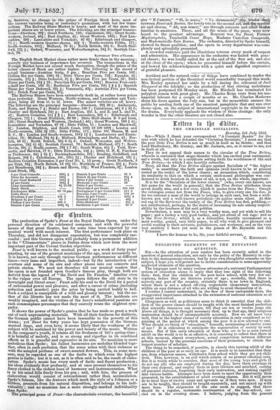t !i ntr.
The production of Spohr's Faust at the Royal Italian Opera, under the personal direction of its celebrated composer, and with the powerful means of that great theatre, has for some time been expected by our musical world with much interest. The first performance took place on Thursday, and did not disappoint expectation, but was completely suc- cessful: and this German opera will probably form a permanent addition to the " Ultramontane" pieces in Italian dress which now form the most important part of the Covent Garden repertoire. Faust is well known to the musical public ; as a work of forty years' standing, by one of the greatest musicians of the age, must necessarily be. It is known, not only through various German performances at different times—very lame and imperfect, indeed—but by the introduction of its overture and some of its airs and other pieces into our concerts and private circles. We need not therefore tell our musical readers that the opera is not founded upon Goethe's famous play, though both are derived from the legend of "the Devil and Dr. Faustus," familiar even to the vulgar over all Europe. The opera follows the old story in its downright and literal sense : Faust sells his soul to the Devil for a period of unbounded power and pleasure, and after a career of crime (including seduction and murder) pays the price by being carried bodily to hell. Such a subject is susceptible of a wild and gloomy interest ; but the au- thor of the libretto has not made the most of it. The incidents age weakly imagined, and the victims of the hero's unhallowed passions are such commonplace personages that they scarcely rouse the slightest sym- pathy. It shows the power of Spohr's genius that he has made so great a work out of such unpromising materials. With all their fondness for diablerie' the German public cannot have been insensible to the poverty of this drama; yet Faust for foety years has kept possession of the German musical stage, and even here, it seems likely that the weakness of the subject will be sustained by the power and beauty of the music. Written in the composer's youth, it retains all the freshness of life's spring-time ; it is brimful of melody, and is as strong and vigortlus in its combined effects as it is graceful and expressive in its airs. No musician is more melodious than Spohr ; his fullest harmonies are melodies blended toge- ther, often in such profusion that the sense aches with their richness as with the mingled perfume of sweet-scented flowers. This, in some mea- sure, may be regarded as one of the faults to which even the highest genius is liable ; but it is not, as it is often said to be, the result of elabo- ration. Spohr's music has every mark of facile and fluent production; his ideas evidently flow profusely, and at once present themselves to 1d fancy clothed in the richest hues of harmony and instrumentation. What is in his mind fella freely from his pen ; and, with him, the process of elaboration would consist of retrenchment rather than accumulation. Spohr's fulness, like the features which mark the style of a Johnson or a Gibbon, proceeds from his natural disposition, and belongs to his indi- viduality; and no musician has a more strongly-marked individuality than Spahr.
The principal gems of Faust—the characteristic overture, the beautiful
airs "E l'amore," "Si, lo sento," " Va sbramando,"...tliya._ er• between Faust and Bosina, the lovely trio in the second actrerldrefiq, air and chorus, " Ah, non tamer," are through concerts and otlier ethai feinilier to amateurs. These, and all the music of the piece, were now heard to the greatest advantage. Ronconi was the Faust, Formes ifephistophdes, Tamberlik Count Hugo, Madame Castellan Cunegonda, and Mademoiselle Zerr Rosina. The orchestra, directed by Spohr himse1.4 showed its finest qualities; and the opera in every department was com- pletely and splendidly presented. A crowded audience paid the illustrious veteran every mark of respect and admiration. His appearance in the orchestra was hailed with gene- ral cheers ; he was loudly called for at the end of the first act, and also at the close of the opera ; when he presented himself before the curtain, and bowed his acknowledgments with a quiet and dignified expression of grateful pleasure.


























 Previous page
Previous page